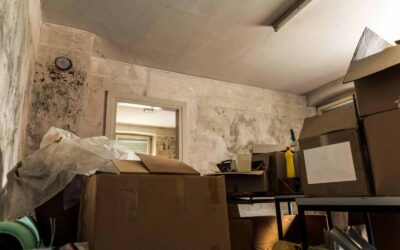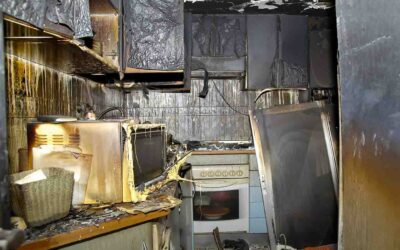Let’s say a pipe bursts in your bathroom or your washing machine starts leaking. Or maybe a heavy rainstorm leads to a flood in your basement.
No matter the cause, water damage can be devastating to a home and leave you with significant, unexpected repair costs. As a homeowner dealing with a water-related emergency, you may wonder, does homeowners’ insurance cover water damage?
The answer is complicated. Standard policies cover some damage, but many will not cover every incident. Here’s what you need to know about what insurance does and doesn’t cover, as well as some tips on how to file a claim successfully.
Types of Water Damage Typically Covered
Most standard homeowners’ insurance policies cover water damage related to sudden or accidental incidents. Your coverage may vary, so always check your policy before filing a claim.
Here are a few scenarios that are commonly covered:
Plumbing Failures
A pipe in your bathroom might suddenly burst, or your water heater unexpectedly malfunction.
The resulting water damage is often covered under homeowners’ insurance. Providers may require proof that the damage was sudden and unavoidable.
Accidental Overflow of Appliances
Your dishwasher could unexpectedly overflow, causing damage to the surrounding floor and walls.
Water overflow from appliances is typically covered. As with plumbing failures, the incident needs to be unexpected and not caused by a lack of maintenance.
Roof Leaks from Storms
Maybe a huge storm blows through and tears some shingles off your roof, causing a leak.
To be covered, the damage needs to be directly linked to the weather event. Insurers will also ask for evidence that the homeowner has maintained the roof properly. Gradual leaks or old, poorly maintained roofs may not be eligible.
Water Damage from Firefighting
Perhaps your home experiences a small fire. The building is fortunately saved, but your home sustains some water damage in the efforts to put out the fire.
In cases of water damage from firefighting or sprinkler systems activated during a home fire, the damage is typically covered under insurance.
Exclusions: When Your Insurance Doesn’t Cover the Damage
Many standard policies do not cover all instances of water damage. It’s important to understand what’s excluded from your policy and decide whether you should purchase additional coverage.
Flooding
If a natural event like a flash flood, heavy rainstorm, tsunami, or overflowing river floods your home, it may not be covered by basic homeowners’ insurance.
Floods can be some of the most devastating and expensive water damage you can face as a homeowner, potentially costing you tens of thousands of dollars. Unfortunately, most homeowners’ insurance policies usually exclude flood damage.
If you live in an area that’s susceptible to flooding, it’s worth making sure your home and possessions are covered. You may need to purchase a separate flood insurance policy through FEMA’s National Flood Insurance Program (NFIP) or a private insurer.
Sewer Backups
Maybe your sump pump fails, or a sewer line backs up, flooding your bathroom.
Despite how much damage they can cause, these incidents are often not covered under standard policies. Some insurers offer sewer damage as an add-on. This can help pay for water and mold damage from backups, clogs, and broken sump pumps.
Long-Term Leaks
A slow leak under a sink could cause water and mold damage in your bathroom.
Long-term leaks are often not covered under insurance, as insurers see them as avoidable damage. Homeowners should inspect their homes regularly and make necessary repairs promptly.
Neglect
You know that a repair should be made but keep putting it off until a later day.
Insurers may deny claims in instances where they determine the homeowner neglected their property or delayed necessary repairs.
Does Homeowners’ Insurance Cover Mold Damage?
When a building is damaged by water, mold is quick to follow, especially here in the Pacific Northwest. Mold can cause additional structural damage to your home, as well as make your family sick, so it should be dealt with as soon as possible.
Most insurance policies only cover mold if it’s caused by sudden, accidental damage, such as a burst pipe. However, your insurer may not cover the full cost, even if they accept your claim. You may still need to pay your deductible—the amount of a claim that you will need to pay before insurance covers costs—and other uncovered costs.
What are the Limits to Homeowners’ Insurance Policies?
Even if your policy covers a certain type of water damage incident, there may be a limit on how much your insurer will pay. Typically, policy limits are based on the overall value of your home and belongings, as well as the specific water damage sustained. Policies will also specify your deductible.
As a homeowner, it’s essential to review your policy limits and consider whether you’re adequately covered in the event of potential water damage.
How to File Successful Claims
It’s overwhelming when water damage occurs, and you may not know where to start. It’s important to keep a clear head and take quick action to improve your chances of a successful insurance claim. Here are a few tips:
- Prevent further damage: Homeowners are responsible for taking steps to prevent additional damage to their property. If the problem is related to the plumbing in your home, shut off your water and begin drying things out immediately. In fact, no matter the origin of the water, start cleaning up the water as much as you can. You should also call in professionals as soon as possible to contain the problem and protect other areas of your home from becoming contaminated or damaged.
- Document the damage: As soon as possible and safe to do so, take photos or videos of the water damage. Insurance companies will ask for visual evidence to support your claim.
- Review your policy: Before filing a claim, review your policy so you understand what’s covered and can set realistic expectations and avoid delays.
- Contact your provider promptly: Notify your insurance provider about the damage as soon as possible. This will expedite claims and repairs.
- Provide necessary documentation: Gather receipts and invoices to demonstrate prior repairs, inspections, or previous maintenance. Insurers are more likely to approve your claim if they see you’ve taken action to maintain your home.
Unsure what documentation or photos you might need? We can help. Biodynamic’s restoration experts know that water damage to your home can be stressful and overwhelming—especially in an emergency.
Don’t worry. As we’re restoring your home, we’ll collect all necessary photo documentation and create a detailed inventory report for you to send to your insurance company.
For trusted water restoration services, call Biodynamic.


